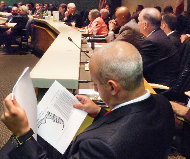1/8/2014
Florida House Opens With Attack On Red Light CamerasFlorida House committee takes up proposal to eliminate profit incentive for localities to use automated enforcement.

Red light cameras are under assault in Florida. The state House of Representatives voted to authorize the use of automated ticketing machines by an overwhelming margin less than four years ago, but the tide quickly shifted. Growing public opposition to the devices was reflected in the 2012 state House vote to ban cameras that stalled in the face of state Senate opposition. On Thursday, the House Transportation and Highway Safety Subcommittee will consider a more subtle multi-part transportation bill that would eliminate the revenue incentive to install automated ticketing machines.
Currently, 77 jurisdictions throughout the state use cameras. Last year they issued 1,094,106 tickets worth $173 million, out of which $62 million was funneled into state coffers. The remainder was split between the cities, counties and for-profit vendors such as American Traffic Solutions. The proposed bill would eliminate the municipal revenue stream by reducing the cost of a ticket from $158 to a maximum of $108.
From this amount, the state would keep its present $83 share of the fine. The locality could then impose a "surcharge" of no more than $25 per ticket, all of which would be paid to the camera vendor, leaving nothing for the city or county. In North Carolina, when the state courts ruled that cities could not profit from the use of red light cameras, nearly every city with a camera program canceled its red light camera contract once it expired. The Florida proposal would ban new camera installations beginning on July 1.
The legislative attack comes as lawmakers are questioning whether localities have been truly installing the cameras for safety purposes. The state required jurisdictions to report on their experience with photo enforcement in 2013, and the results showed one-fourth of cities did not bother tracking whether accidents increased or decreased as a result of red light cameras use. State officials were also dismayed that cities were fudging the data compared to state accident records.
"Respondents who reported crash data indicated an overall decrease in crashes at intersections with red light cameras," the House legislative analyst wrote. "However, crash data maintained by DHSMV indicates that crashes at all red light intersections typically increased, both statewide and in the surveyed jurisdictions."
A copy of the proposed legislation is available in a 250k PDF file at the source link below.


